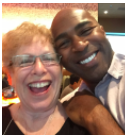On a Thursday night, students of Troy City Schools, along with teachers and community members, got together and had a chat. This particular day, called Chats on a Square, was inspired by the popular Ted Talks, but with a twist. Instead of just having talks, different genres of art were displayed. There were music selections, poetry, artwork, and inspirational speeches at Chats on the Square. You heard dialogues from University professors, songs and acting from dram club students, and powerful poetry and speeches from several individuals from Troy City.

To top off the evening, were two motivational chats from community members who grew up in Troy, went to school, and are now key figures of the City of Troy.
This year's Chats on the Square, was based on having powers; powers of persuasion, purpose, process, and the power of poetry and prose. The evening started off with a light selection of music by Henry Everett. After Mr. Everett's selection of jazz music, senior Kat Deal performed several songs with her guitar. This sparked the interest of the community as they walked downtown Troy, which led some to sit and listen.
The MC for the night, Ms. Elizabeth Huggins, welcomed everyone and gave a brief synopsis of what was in store for the night. Each session had a teacher to give their thoughts on a particular power, followed by selections from students and other community members.
Carrie Rice gave a revelation on why it is important to express yourself through poetry. She was followed by two students, who recited poems, which placed them in this year's Poetry Out Loud competition. Sherrell Walker, a senior for Charles Henderson High school, performed "Living", while Reagan Gross, a junior, performed "A Poison Tree", by William Blake.

Mrs. Judith Park, Theatre teacher for CHHS, allowed us to take a sneak peak at some of the upcoming attractions, she and her class will be performing. Their first selection was "Someone in the Crowd", from La La Land, followed behind a scene from their upcoming play "You're a Good Man Charlie Brown. Both selections had the crowd applauding and laughing at the humor from the selections.



During the middle of the night, there were more chats and dialogues from community members, Mr. Quinton Cockrell of Troy University Theatre Department, gave an outstanding dialogue; Mallory Hughes and Marley Park, owners of Confetti Crate, spoke on perseverance and how they are where they are today; Charlotte Walden explained the process and journey it takes to create a work of art; Pam Smith, a retired teacher, explained the joys and benefits of traveling the world.
To persuade the crowd, Ms. Huggins explained the different ways of persuasion, and was then followed behind three presenters, that made you shake your head in agreement with their thoughts and words. CHHS senior, Orion Nokes, had everyone believing that "reaching for the sky" isn't enough anymore. He spoke on the importance of having programs in school such as FBLA and how it influences him daily.
Ending the night, were the keynote presenters for Chats on the Square. It began with an introduction by Mrs. Casey Moore, as she explained that there is so much time we have, but aren't using it at all. That the time we have in a day, after work and before bed, is critical to our growth as a person, whether it is growth to your family, growth to your own business or even yourself, we all have time. This was followed by Dan Smith, of Troy Parks and Recreation, and Mitchell Sneed, owner of Suso Enterprises.

"Its ok not to be liked when it lines up with your purpose. Your movement sometimes, everyone will not be okay with it. But that's fine. Because this is your purpose...you define who you are". These were some of the passages from Mr. Sneed's message for the night, as he challenged everyone to define their passion, know who you are, and continue to let your passion drive you.




















